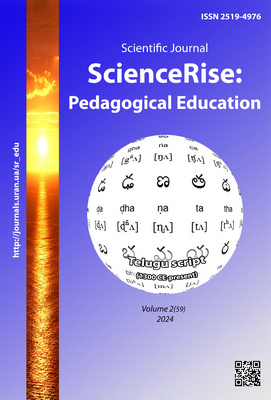Foreign experience of software testing engineers training: analysis of educational standards and programs of American universities
DOI:
https://doi.org/10.15587/2519-4984.2024.304973Keywords:
software engineering, software testing, educational standard, training program, foreign experienceAbstract
The article aims to explore the U.S. educational system's approach to training software testing specialists, highlighting specific features and methodologies. The study involves analyzing key standards for IT engineer training in the USA, such as the ACM/IEEE Computer Science Curricula, ABET Accreditation Criteria, ISTE Standards for Educators, and CSTA K-12 Computer Science Standards, their overall context and targeting, as well as the inclusion of both fundamental and IT-specific disciplines into their content. In the study of each standard, particular emphasis was placed on defining the place and teaching methods of theory and practice of software testing in the university curriculum guidelines. As it was revealed in the analysis, despite the extremely similar interpretation of basic concepts and practices in the context of software testing, opinions about the methodology of their teaching and the need to study as a separate discipline, differ in a set of reviewed standards.
Additionally, the research examines training programs at leading American universities, including MIT, Stanford, and Carnegie Mellon University, to identify how software testing and quality assurance are reflected in their curricula, covering full-time training programs for students in computer science, software engineering and similar related fields. The analysis examined programs in both general and basic disciplines in the context of information technology, and specific to a certain technological or organizational area, such as mobile device development or IT project management. The content of the subjects, the list of modules and lectures, as well as tasks for extracurricular work, available in open sources, was also analyzed and searched for topics related to quality assurance or software testing. As revealed in the study, in most technical universities testing is not covered within a separate discipline, but is taught as a part of ones related to development practices. However, some training programs, in particular the Master's level, still have disciplines, devoted exclusively to quality control, testing management and automation
References
- Avsheniuk, N., Diachenko, L., Kotun, K., Marusynets, M., Ohiienko, O., Sulyma, O., Postryhach, N. (2017). Zarubizhnyi dosvid profesiinoi pidhotovky vchyteliv. Kyiv: DKS "Tsentr", 83.
- Vorobiova, O., Debych, M., Luhovyi, V., Orzhel, O., Sliusarenko, O., Talanov, Zh., Tryma, K. (2019). Analiz providnoho vitchyznianoho ta zarubizhnoho dosvidu otsiniuvannia yakosti vyshchoi osvity v konteksti yevropeiskoi intehratsii: Analitychni materialy (Chastyna II). Kyiv: Instytut vyshchoi osvity Natsionalnoi akademii pedahohichnykh nauk Ukrainy, 150.
- Ctriuk, A. M. (2018). Software engineering: first 50 years of formation and development. CEUR Workshop Proceedings, 2292, 11–36.
- Schachterle, L., Demetry, C., Orr, J. A.; Patil, A., Gray, P. (Eds.) (2009). Quality Assurance in Engineering Education in the United States. Engineering Education Quality Assurance. Boston: Springer. https://doi.org/10.1007/978-1-4419-0555-0_13
- Garousi, V., Mathur, A. (2010). Current State of the Software Testing Education in North American Academia and Some Recommendations for the New Educators. 2010 23rd IEEE Conference on Software Engineering Education and Training. https://doi.org/10.1109/cseet.2010.29
- Astigarraga, T., Dow, E. M., Lara, C., Prewitt, R., Ward, M. R. (2010). The Emerging Role of Software Testing in Curricula. 2010 IEEE Transforming Engineering Education: Creating Interdisciplinary Skills for Complex Global Environments. https://doi.org/10.1109/tee.2010.5508833
- Melo, S. M., Moreira, V. X. S., Paschoal, L. N., Souza, S. R. S. (2020). Testing Education. Proceedings of the XXXIV Brazilian Symposium on Software Engineering. New York, 554–563. https://doi.org/10.1145/3422392.3422483
- Curricula Recommendations. ACM/IEEE Computer Science Curricula. ACM and IEEE. Available at: https://www.acm.org/education/curricula-recommendations
- Accreditation Criteria & Supporting Documents. ABET. Available at: https://www.abet.org/accreditation/accreditation-criteria/
- ISTE Standards for Educators. International Society for Technology in Education. Available at: https://www.iste.org/standards/iste-standards-for-teachers
- CSTA K-12 Computer Science Standards. Computer Science Teachers Association. Available at: https://www.csteachers.org/page/standards
- Massachusetts Institute of Technology. Available at: https://web.mit.edu
- Computer Science Computer Engineering Track 2023-2024. Stanford University. Available at: https://drive.google.com/file/d/1BTFWYpVkGlaBF3vigGXVifxwY7qLoPwh/view
- 1020: Software Construction. Massachusetts Institute of Technology. Available at: https://catalog.mit.edu/search/?P=6.1020
- 1820: Mobile and Sensor Computing. Massachusetts Institute of Technology. Available at: https://catalog.mit.edu/search/?P=6.1820
- 1060: Software Performance Engineering. Massachusetts Institute of Technology. Available at: https://catalog.mit.edu/search/?P=6.1060
- Academics: Bachelor's Program. Stanford University. Available at: https://www.cs.stanford.edu/academics/academics-bachelors-program
- CS 107: Computer Organization and Systems. Stanford University. Available at: https://web.stanford.edu/class/cs107/
- CS 194: Software Project. Stanford University. Available at: https://web.stanford.edu/class/cs194/
- Bachelor of Science in Computer Science. Carnegie Mellon University. Available at: https://csd.cmu.edu/academics/bachelors/overview
- CS Sample Curriculum Schedule. Carnegie Mellon University. Available at: https://csd.cmu.edu/sites/default/files/2024-04/CS_Sample_Curriculum_Schedule.pdf
- Computer Science Program. Carnegie Mellon University. Available at: http://coursecatalog.web.cmu.edu/schools-colleges/schoolofcomputerscience/undergraduatecomputerscience/#bscurriculumtextcontainer
Downloads
Published
How to Cite
Issue
Section
License
Copyright (c) 2024 Oleksandr Gura

This work is licensed under a Creative Commons Attribution 4.0 International License.
Our journal abides by the Creative Commons CC BY copyright rights and permissions for open access journals.
Authors, who are published in this journal, agree to the following conditions:
1. The authors reserve the right to authorship of the work and pass the first publication right of this work to the journal under the terms of a Creative Commons CC BY, which allows others to freely distribute the published research with the obligatory reference to the authors of the original work and the first publication of the work in this journal.
2. The authors have the right to conclude separate supplement agreements that relate to non-exclusive work distribution in the form in which it has been published by the journal (for example, to upload the work to the online storage of the journal or publish it as part of a monograph), provided that the reference to the first publication of the work in this journal is included.







